June 17, 2014
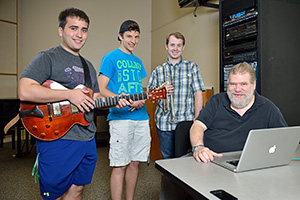
Lynn Seaton, associate professor of jazz studios, earned UNT's Creative Impact Award
at last year's Salute to Faculty Excellence Award event. (Photo by Michael Clements)
The Succeed at UNT campaign, launched last year, offers practical advice to help students navigate college life. And, at the forefront of the campaign is the support from faculty and staff. Faculty members revealed their own philosophies about how they help students achieve their goals toward graduation.
Randolph "Mike" Campbell, Regents Professor of history and 2013 winner of the UNT Foundation Eminent Faculty Award
Supporting student success is a matter of setting high standards and offering constant assistance and encouragement in meeting those standards. Students are often surprised at what they can achieve when significant goals are set for them. Assistance and encouragement come in many forms; the most important of which is simply being available to advise and answer questions. I am on campus virtually every day, and my door is always open when I am there. Students know that I will do everything within my abilities to support their work, but that success is theirs to earn.
Ruthanne "Rudi" Thompson, associate professor of biological sciences and 2013 winner of the UNT Foundation Faculty Community Engagement Award
Albert Einstein once stated: "It is the supreme art of the teacher to awaken joy in creative expression and knowledge."
When people ask me what I do, I take great pride in telling them I am a teacher. Yes, I also am a scientist and have a passion for research, but first and foremost, I am a teacher. I believe that this pride and passion drive me to continue to work tirelessly both with and for the success of my students. And I hope this pride and passion will help inspire the next generation of biologists and biological science educators. To that end, I believe it is our role, as scientists and as educators, to translate the language of science in a way that all students can understand.
So how do I support student success? By facilitating a student's learning of science in such a way that they can conceptually understand and critically analyze the world in which they live and empowering them to make informed decisions about their lives and their roles within our shared environment.
Angela Wilson, Regents Professor of chemistry and 2013 winner of the UNT Foundation Faculty Leadership Award
Engaging students outside the classroom in research, internships and other opportunities, and serving as a good mentor to students can play a critical part in their career development. As a freshman college student, I received a scholarship that expected engagement in research. I worked in a microbiology laboratory, which planted a seed -- a desire to seek additional outside-of-the-classroom opportunities. I did, and those opportunities played a pivotal role in setting my career path. Throughout those experiences, I benefited from the counsel of a superb mentor, who, to this day, has had an influence upon my career.
Thus, I work with students to try to be the best mentor I can, preparing them for their future careers and helping them gain the training that they need. I encourage them to pursue outside-of-the-classroom experiences and help them find opportunities. And I continue to be a part of their mentor (and then colleague) network as long as they wish beyond graduation.
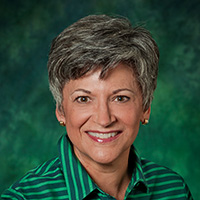 Elizabeth R. Arnold, adjunct professor of merchandising and digital retailing and 2013 winner of the Outstanding Online Teacher & Course Award
Elizabeth R. Arnold, adjunct professor of merchandising and digital retailing and 2013 winner of the Outstanding Online Teacher & Course Award
I hope my students feel that I support them by being accessible, "listening" to what they write, and responding to them individually -- all done via Blackboard! I rarely meet students face-to-face, but I want my students to know they can reach me and expect a response in a reasonable amount of time.
Online courses are wonderful opportunities for students to manage coursework around other responsibilities. I encourage students to log on daily and check Blackboard messages, announcements, and their course calendar. Information is placed in all these tools and supports students' efforts to organize schedules, plan coursework and successfully complete the course requirements.
Engaging students and assessing progress is done through a variety of activities/methods. Review Periods were established to encourage students to address any aspect of an activity they choose. This allows a dedicated time for students to discuss every activity with me and provides feedback that supports a positive experience and student improvement.
Updating course content supports students' interests, involvement and creativity. Current research and industry information is constantly added to course content to ensure students are prepared to be competitive in the workplace. I want students to have accurate information, add to their knowledge and be successful!
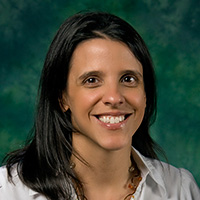 Casey A. Barrio Minton, associate professor of counseling and higher education and 2013 winner of the President's Council Teaching Award
Casey A. Barrio Minton, associate professor of counseling and higher education and 2013 winner of the President's Council Teaching Award
I was a counselor before I became a teacher of counselors, and I find myself carrying the same two fundamental assumptions into both roles:
- Humans are capable of positive growth
- Growth toward maximum potential must be fostered via positive, empowerment-based relationships
Students develop relationships in unique ways and need different things in their journeys toward success. It's my job to help uncover and create opportunities to meet those needs. This means supporting student success through flexible assignments, new instructional approaches and engagement with our student organization.
I may support one student's success through personalized contact or encouragement when he is struggling the most. I may reach another through caring confrontation and not accepting work beneath her potential. For another, supporting student success might mean technical or collaborative support to translate work into a conference presentation, grant proposal or journal article.
While my methods for supporting student success vary, my primary goals are unwavering:
- To stimulate interest and commitment to the counseling profession, model integrity and professionalism
- To facilitate personal growth so students will be effective in their work to promote human dignity and potential
Ed Blackburn, studio arts and 2013 SGA Honor Professor
Except for part-time positions now and then, I operated more as artist than teacher until I joined the UNT faculty during the mid-1990's. Being closely involved with a particularly good art department for the first time, I began a crash course in the deeper dimensions of teaching, which continues to this day.
One's individual way of thinking and seeing shows through in every facet of their life, but it is particularly apparent when making art. While conveying structural and aesthetic fundamentals is integral to a good art program, it seems that working to find the shape of each student's unique ideal remains the heart and soul of teaching art. In pursuing this goal I have some guidelines but not a formula. Fortunately each new student has within themselves, a roadmap and the access to it.
Bruce Bond, Regents Professor of English and 2013 winner of the Toulouse Scholar Award
Success takes many forms, the most obvious of which is vocational. I am hardly unique in my department in not only opening doors of knowledge, but also encouraging and modeling the spirit of inquiry necessary to participate more fully in literature and its related professions.
The art of teaching, then, is a bit like the art of poetry itself -- one must listen very closely and in our speech embody something of our listening. While many of our students, thanks in part to our collective mentoring, honor us all as professors and writers of poetry, this measure of success always is grounded in a broader and deeper sense that applies to all my students, including those who enter other professions. Through honesty, care, and a somewhat poetic combination of rigor and play, I hope to provide students with a climate where poetry, broadly understood as a universal activity, begins to radiate as essential to the growth of all language: its birthing of relational being and a felt sense of why that matters. I try -- through my own listening and love of the art -- to help others find and deepen that love and thus live with greater awareness, creative will, empathy and engagement.
Peter Collins, assistant professor of materials science and engineering and 2013 winner of the Early Career Award for Research & Creativity
This I believe: When regarded (erroneously) as a prize to be obtained, success is fleeting. Yet when success is an external validation of accomplishments derived from fundamental characteristics rather than an end in itself, it can be enduring.
Within higher education, the dichotomy is clear: We desire our graduates to be successful in their fields; yet we operate in a system where value is placed on short-term assessments, where students prize grades. We see cramming invariably followed by a post-exam or post-semester "brain dump."
How do I engender characteristics in students that lead to true success? In both classroom and laboratory, I engage, challenge and question so that students learn to value inquiry, tenacity, synthesis and perpetual learning. These values spark true success.
Our students will be successful, beyond the typical academic snapshot, if they can:
- Inquire and thus propose a genesis thought
- Be tenacious so as to sustain efforts through the doldrums
- Synthesize and integrate knowledge from seemingly disparate subjects
- Remain awake in their broader world
These values know no bound of applicability or discipline. The potential to be viewed as "successful" should be democratic (small "d"), afforded to all without ceasing, as knowledge has no terminal degree.
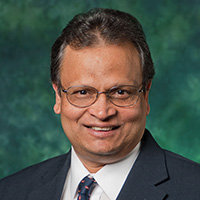 Francis D'Souza, Distinguished University Research Professor of chemistry and materials science and engineering and 2013 winner of the Distinguished Research Professor Award
Francis D'Souza, Distinguished University Research Professor of chemistry and materials science and engineering and 2013 winner of the Distinguished Research Professor Award
While being an educator is a noble profession, it is undoubtedly very fulfilling and a rewarding one as well. For as long as I can recall, I have enjoyed teaching. Growing up, I satiated this passion of mine by teaching my siblings. Watching some of my own exceptional teachers, I often mimicked their teaching techniques when playing "school" with my siblings.
I was amazed at how one technique benefited one person while a different technique benefited another. I adapted varying teaching styles as I dealt with each of my siblings. This dynamic approach taught me to adapt to students' needs and to the ever-changing world with the fast-paced technological advancements in classroom teaching.
Being an avid researcher in chemistry and materials science and engineering has helped me convey the most recent, state-of-the-art scientific and technological discoveries to my students. I always have considered the success of my students as a reward in and of itself.
I have thoroughly enjoyed teaching chemistry -- especially to freshmen and undergraduate students. The enthusiasm of my students spurs me to make an otherwise difficult class very interesting and engaging. Using inquiry-based teaching techniques, combined with demonstrations and laboratory experiments, helps my students comprehend the material much more easily.
As a teacher, I am actively involved in training our future educators, scientists, engineers and health professionals. UNT has given me this opportunity to enjoy doing what I love the most -- being a teacher and a researcher! And I am grateful for this opportunity.
Janice A. Hauge, associate professor of economics and 2013 winner of the President's Council Teaching Award
The new Succeed at UNT campaign echoes my philosophy. Most professors have preached these steps for years; now we have a voice of unity in reaching our students. Encouraging students to attend class, to ask us for help, to do their homework and to study is the norm for many of us. Making it happen is more difficult.
Of course, I would like for my students to remember the most important tenets of my discipline -- economics -- because I believe doing so will make them better citizens. However, my students often need to be convinced of this.
I believe that if I help students see how their choices direct their lives and help them understand that obtaining knowledge gives them power, they are more engaged in class.
But what's more directly applicable to students' success is their belief that they matter. If I call them by name, they tend to come to class. If I am approachable, they ask questions. If I have high expectations for them and remind them they are capable of meeting them, they do their homework. And if I treat them with respect and demand respect in return, they tend to study. The result is student success -- and gratified faculty!
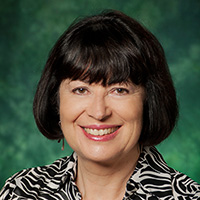 Marie-Christine Koop, professor of French and 2013 winner of the President's Council University Service Award
Marie-Christine Koop, professor of French and 2013 winner of the President's Council University Service Award
I always focus my efforts on retaining students and attracting new ones. To this end, I strive to make my courses interesting, and especially to find new topics and new ways to increase the motivation level of my students. I also try to arouse their enthusiasm for French by encouraging them to participate in study-abroad programs and internships, and I have developed and directed several such programs.
Whenever I notice that students are at risk of failing, I contact them and offer to meet with them in order to help them identify the root of their problems, propose possible solutions and go over the materials with them if they have trouble mastering the course content. Very often, students need nurturing. They often feel lost on a large campus such as ours, and letting them know that we care about their success can make a big difference in their progress. They always show appreciation for the personalized attention they receive in such cases. I enthusiastically support the Succeed at UNT campaign as it provides concrete tools for both the students who are at risk and the faculty who want to help them.
Jon Peters, professor of English and 2013 winner of the Distinguished Research Professor Award
I consider research and teaching to have a symbiotic relationship, such that my teaching informs my research and my research informs my teaching.
I think that it is particularly important to be able to convey to students the knowledge I gain through my research, which I hope will help them to understand the material I present and to see it from various perspectives and to recognize the various permutations that literary analysis entails. As such, my primary goal in any class is for students to leave the class feeling that they have gained knowledge not only of the general topic of the course, but also of the individual works we have studied during the course of the semester.
Ideally, they then can take this knowledge and apply it to material they encounter in other literature courses as well as in courses in other fields of study.
Lynn Seaton, professor of jazz studies and 2013 winner of the Creative Impact Award
To prepare students to be successful performers in the music business is an issue that we as educators deal with every day. My expectations for the teaching and learning environment at UNT have been surpassed. The openness of the students to trying new concepts is the best I have ever encountered. The average applicant for the jazz studies program possesses a level of proficiency that is a joy to see.
Part of the fun of teaching here is taking these eager talented musicians and guiding them to the next level. There is a great deal of competition for gigs. I do my best to prepare my students by providing them with the tools needed to succeed outside of the school environment. We discuss bandstand etiquette and musical savviness for different situations. They work on reading rhythm and improvising on chord changes. I have them master a large number of tunes from the standard repertory so they can go on a gig and play them from memory at a high level. They study scales and arpeggios so that they learn the basics of their instrument from top to bottom. Classic jazz recordings are studied and transcribed to familiarize students with the important history of the art form they are studying.
The analogy of "the tallest skyscraper has the biggest foundation" is an important one. Studying what has been a part of jazz history will give them the foundation to build their own voice as an improviser. I also like to perform in jam sessions and on gigs with students to give the students direct and immediate experience with a professional musician. This has been the time-honored tradition of teaching young jazz musicians since jazz was created.
Linda Stromberg, chair of educational administration and 2013 winner of the Exemplary Online Teacher & Course Award
Good communication is very important for student success. In online and face-to-face classes, I respond quickly to student questions. I also assume positive intent on the part of the students. If students have questions, I know that perhaps I did not explain assignments and requirements completely, and I work to take care of misunderstandings. I also try my best to make assignments and other requirements as clear as I possibly can, and I include rubrics with all assignments to emphasize the ways students can be successful.
Yong Tao, PACCAR Professor of Engineering, Director of PACCAR Technology Institute, mechanical and energy engineering and 2013 winner of the Distinguished Research Professor Award
As Theodore von Karman, the 1962 National Medal of Science (NMS) recipient, mathematician, aerospace engineer and physicist, once said, "Scientists study the world as it is, engineers create the world that never has been."
Therefore, in engineering, in addition to basic training, interpersonal skills, interacting with non-engineering professions and peers are crucial to preparing our students to be creative thinkers and to be successful in their future career. During my more than 30 years of teaching and research, I always have engaged students, who have diverse backgrounds, to maximize their strengths and minimize their weakness. Here are a few things I've done:
- Encourage them to join professional societies and expose themselves to the real world as early as possible.
- Encourage them to be involved with people from different disciplines that widen their horizon.
- Encourage under-represented minority students to set high bars. I welcome them to stop by on a regular basis for close interaction.
- Encourage students to endure challenges by sharing my own life experiences with hardship examples.
- Encourage students to take on leadership roles and to interact with faculty as much as they can.
Elizabeth Turner, professor of history and 2013 winner of the Distinguished Teaching Professor Award
Students need to know that we support them and want them to succeed. We can encourage that by imparting our own enthusiasm for the subject. When I chose to pursue a university career in history, I did so because I found the subject so compelling and so interesting that I wanted to share it with students.
Enthusiasm is the key; but what also helps students are clearly explained expectations, fairness in grading and an understanding of their personal situations. This can be accomplished by spelling out guidelines in the syllabus or instructions, by showing them the importance of analysis in their written work and by allowing them to express their thoughts.
Challenging students to learn, to think independently and to communicate their ideas is at the foundation of all education.
Wendy Watson, political science, pre-law advisor and 2013 winner of the Core Curriculum Innovation Award
I support student success by infusing my classes with the enthusiasm I have for the subject being taught and by trying to identify and encourage struggling students as early as possible.
Lawrence Williams, associate professor of French, associate chair, Department of World Languages, Literatures, and Cultures and 2013 winner of the UNT Teacher Scholar Award
One way I support student success is by reminding students that everything cannot be learned in a textbook. This may be obvious to many of us, but students often seem to think that memorizing everything in the textbook is the sole path to success.
As a foreign language teacher and researcher, I encourage students to explore language as it is used in various contexts, most of which provide a rather striking contrast to what can be found in and learned from dictionaries and textbooks. Although spending time in another country is an excellent way to explore languages and cultures, I often remind students that they are quite fortunate to have access to the world via the Internet, which has communication features, spaces, and tools for many different languages.
In the same way that I encourage students to explore beyond the textbook, I encourage them to discover all the world has to offer beyond the classroom, which is only a starting point for learning.